Entrepreneurship and Small Business Analysis
VerifiedAdded on 2020/07/23
|16
|4648
|75
AI Summary
The provided assignment details are from a journal article that discusses the concept of entrepreneurship and small business, including its definition, characteristics, and importance. The article also explores various aspects of entrepreneurship and small business, such as sustainable development, social entrepreneurship, and public procurement's contribution to entrepreneurship and small business policy. The summary provides an overview of the assignment content, highlighting key topics and themes that are relevant to the field of entrepreneurship and small business.
Contribute Materials
Your contribution can guide someone’s learning journey. Share your
documents today.
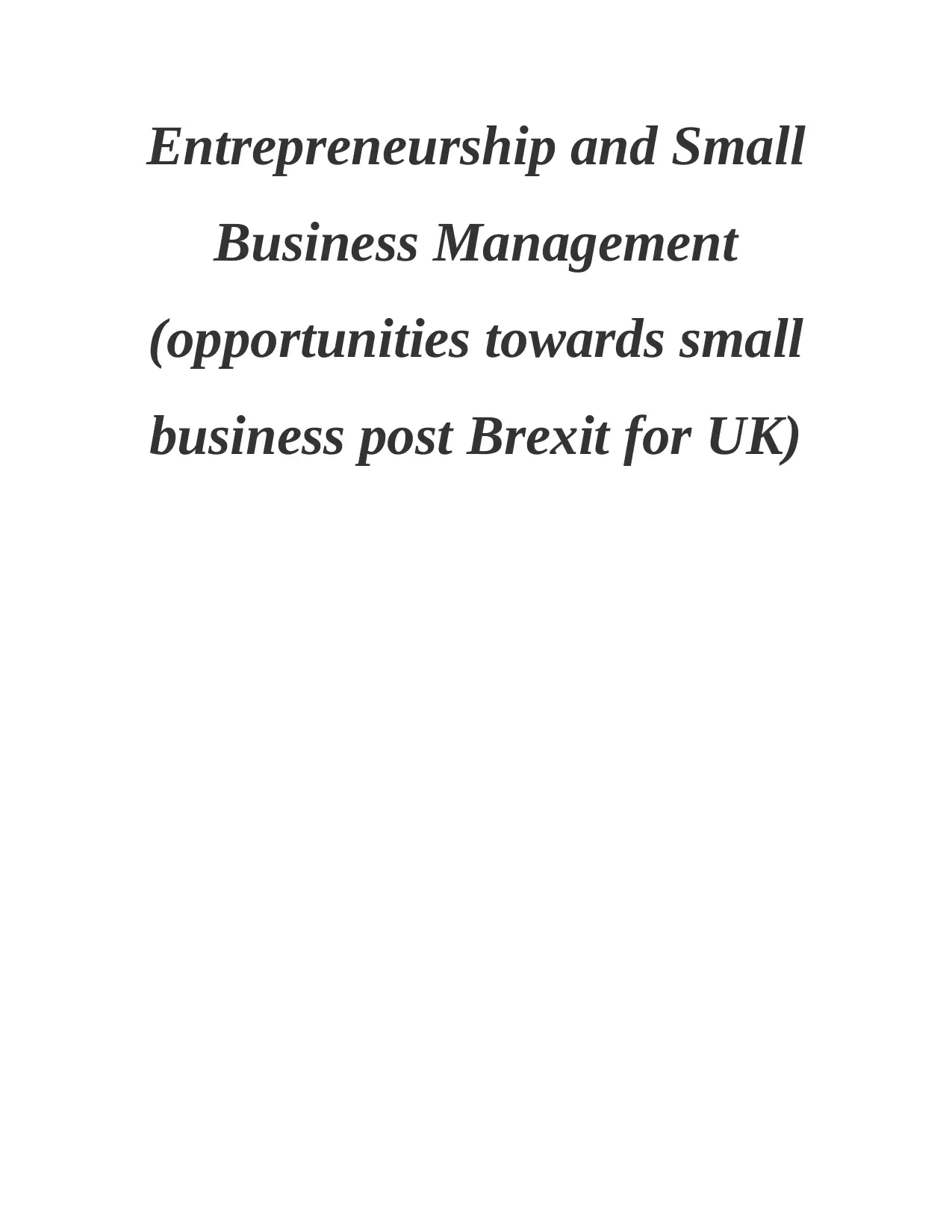
Entrepreneurship and Small
Business Management
(opportunities towards small
business post Brexit for UK)
Business Management
(opportunities towards small
business post Brexit for UK)
Secure Best Marks with AI Grader
Need help grading? Try our AI Grader for instant feedback on your assignments.
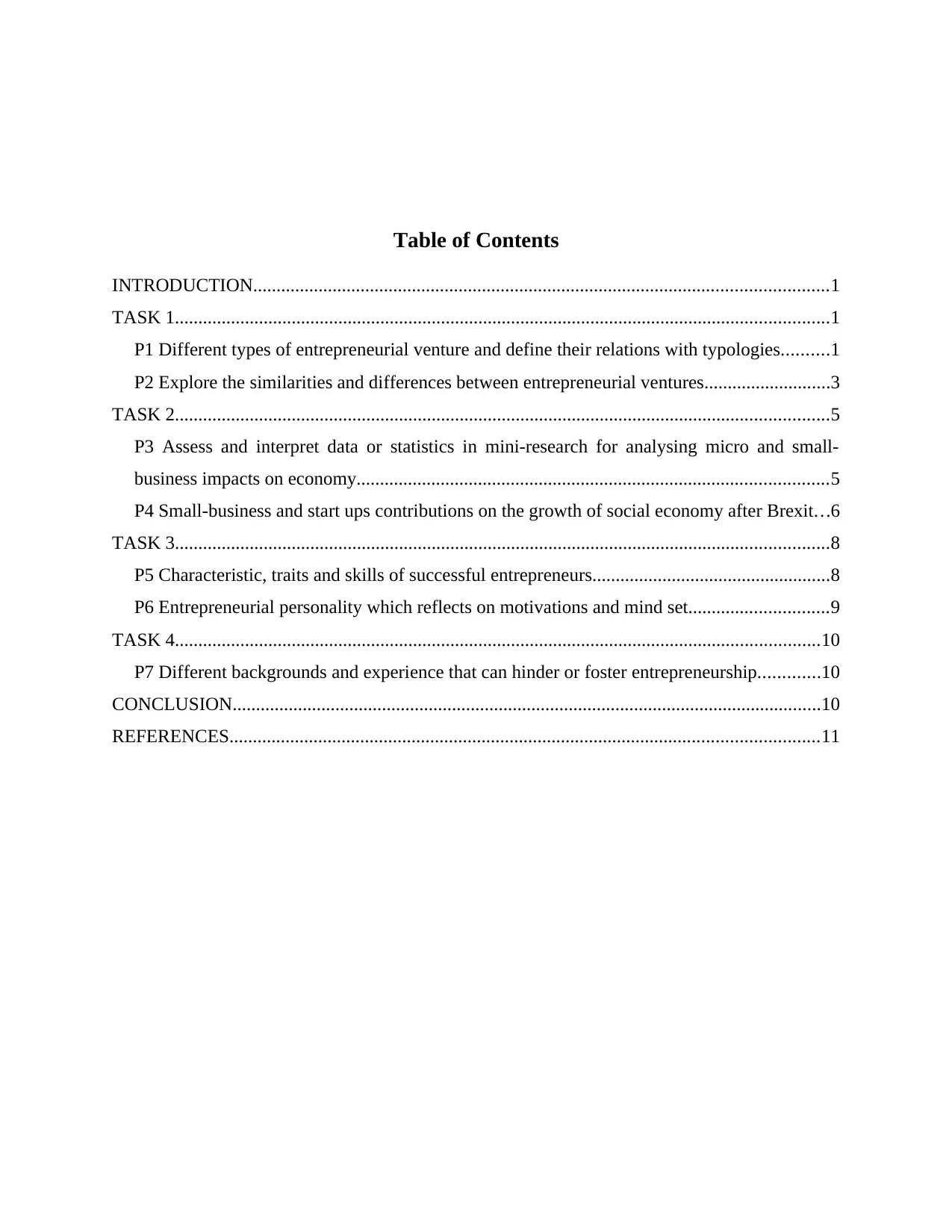
Table of Contents
INTRODUCTION...........................................................................................................................1
TASK 1............................................................................................................................................1
P1 Different types of entrepreneurial venture and define their relations with typologies..........1
P2 Explore the similarities and differences between entrepreneurial ventures...........................3
TASK 2............................................................................................................................................5
P3 Assess and interpret data or statistics in mini-research for analysing micro and small-
business impacts on economy.....................................................................................................5
P4 Small-business and start ups contributions on the growth of social economy after Brexit...6
TASK 3............................................................................................................................................8
P5 Characteristic, traits and skills of successful entrepreneurs...................................................8
P6 Entrepreneurial personality which reflects on motivations and mind set..............................9
TASK 4..........................................................................................................................................10
P7 Different backgrounds and experience that can hinder or foster entrepreneurship.............10
CONCLUSION..............................................................................................................................10
REFERENCES..............................................................................................................................11
INTRODUCTION...........................................................................................................................1
TASK 1............................................................................................................................................1
P1 Different types of entrepreneurial venture and define their relations with typologies..........1
P2 Explore the similarities and differences between entrepreneurial ventures...........................3
TASK 2............................................................................................................................................5
P3 Assess and interpret data or statistics in mini-research for analysing micro and small-
business impacts on economy.....................................................................................................5
P4 Small-business and start ups contributions on the growth of social economy after Brexit...6
TASK 3............................................................................................................................................8
P5 Characteristic, traits and skills of successful entrepreneurs...................................................8
P6 Entrepreneurial personality which reflects on motivations and mind set..............................9
TASK 4..........................................................................................................................................10
P7 Different backgrounds and experience that can hinder or foster entrepreneurship.............10
CONCLUSION..............................................................................................................................10
REFERENCES..............................................................................................................................11

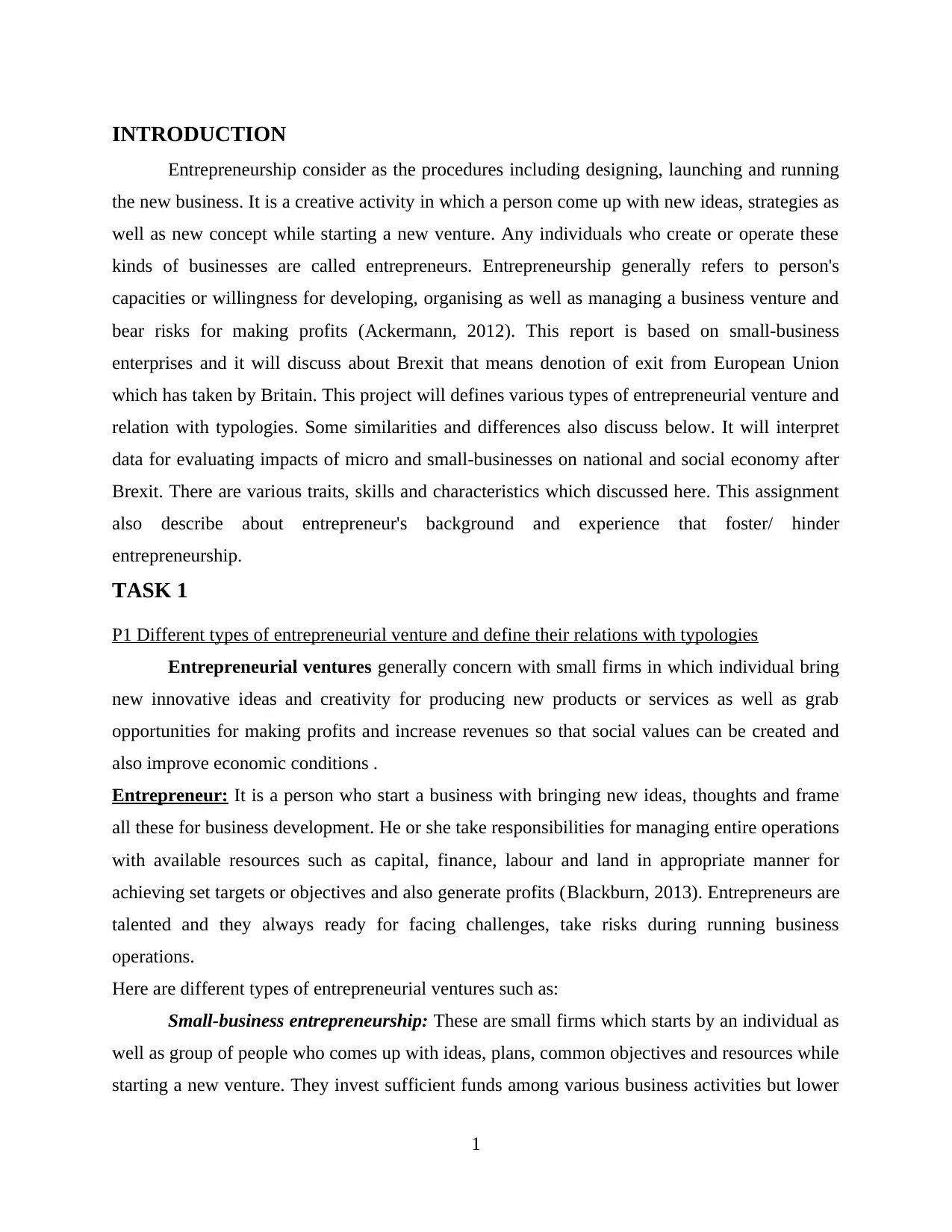
INTRODUCTION
Entrepreneurship consider as the procedures including designing, launching and running
the new business. It is a creative activity in which a person come up with new ideas, strategies as
well as new concept while starting a new venture. Any individuals who create or operate these
kinds of businesses are called entrepreneurs. Entrepreneurship generally refers to person's
capacities or willingness for developing, organising as well as managing a business venture and
bear risks for making profits (Ackermann, 2012). This report is based on small-business
enterprises and it will discuss about Brexit that means denotion of exit from European Union
which has taken by Britain. This project will defines various types of entrepreneurial venture and
relation with typologies. Some similarities and differences also discuss below. It will interpret
data for evaluating impacts of micro and small-businesses on national and social economy after
Brexit. There are various traits, skills and characteristics which discussed here. This assignment
also describe about entrepreneur's background and experience that foster/ hinder
entrepreneurship.
TASK 1
P1 Different types of entrepreneurial venture and define their relations with typologies
Entrepreneurial ventures generally concern with small firms in which individual bring
new innovative ideas and creativity for producing new products or services as well as grab
opportunities for making profits and increase revenues so that social values can be created and
also improve economic conditions .
Entrepreneur: It is a person who start a business with bringing new ideas, thoughts and frame
all these for business development. He or she take responsibilities for managing entire operations
with available resources such as capital, finance, labour and land in appropriate manner for
achieving set targets or objectives and also generate profits (Blackburn, 2013). Entrepreneurs are
talented and they always ready for facing challenges, take risks during running business
operations.
Here are different types of entrepreneurial ventures such as:
Small-business entrepreneurship: These are small firms which starts by an individual as
well as group of people who comes up with ideas, plans, common objectives and resources while
starting a new venture. They invest sufficient funds among various business activities but lower
1
Entrepreneurship consider as the procedures including designing, launching and running
the new business. It is a creative activity in which a person come up with new ideas, strategies as
well as new concept while starting a new venture. Any individuals who create or operate these
kinds of businesses are called entrepreneurs. Entrepreneurship generally refers to person's
capacities or willingness for developing, organising as well as managing a business venture and
bear risks for making profits (Ackermann, 2012). This report is based on small-business
enterprises and it will discuss about Brexit that means denotion of exit from European Union
which has taken by Britain. This project will defines various types of entrepreneurial venture and
relation with typologies. Some similarities and differences also discuss below. It will interpret
data for evaluating impacts of micro and small-businesses on national and social economy after
Brexit. There are various traits, skills and characteristics which discussed here. This assignment
also describe about entrepreneur's background and experience that foster/ hinder
entrepreneurship.
TASK 1
P1 Different types of entrepreneurial venture and define their relations with typologies
Entrepreneurial ventures generally concern with small firms in which individual bring
new innovative ideas and creativity for producing new products or services as well as grab
opportunities for making profits and increase revenues so that social values can be created and
also improve economic conditions .
Entrepreneur: It is a person who start a business with bringing new ideas, thoughts and frame
all these for business development. He or she take responsibilities for managing entire operations
with available resources such as capital, finance, labour and land in appropriate manner for
achieving set targets or objectives and also generate profits (Blackburn, 2013). Entrepreneurs are
talented and they always ready for facing challenges, take risks during running business
operations.
Here are different types of entrepreneurial ventures such as:
Small-business entrepreneurship: These are small firms which starts by an individual as
well as group of people who comes up with ideas, plans, common objectives and resources while
starting a new venture. They invest sufficient funds among various business activities but lower
1
Secure Best Marks with AI Grader
Need help grading? Try our AI Grader for instant feedback on your assignments.
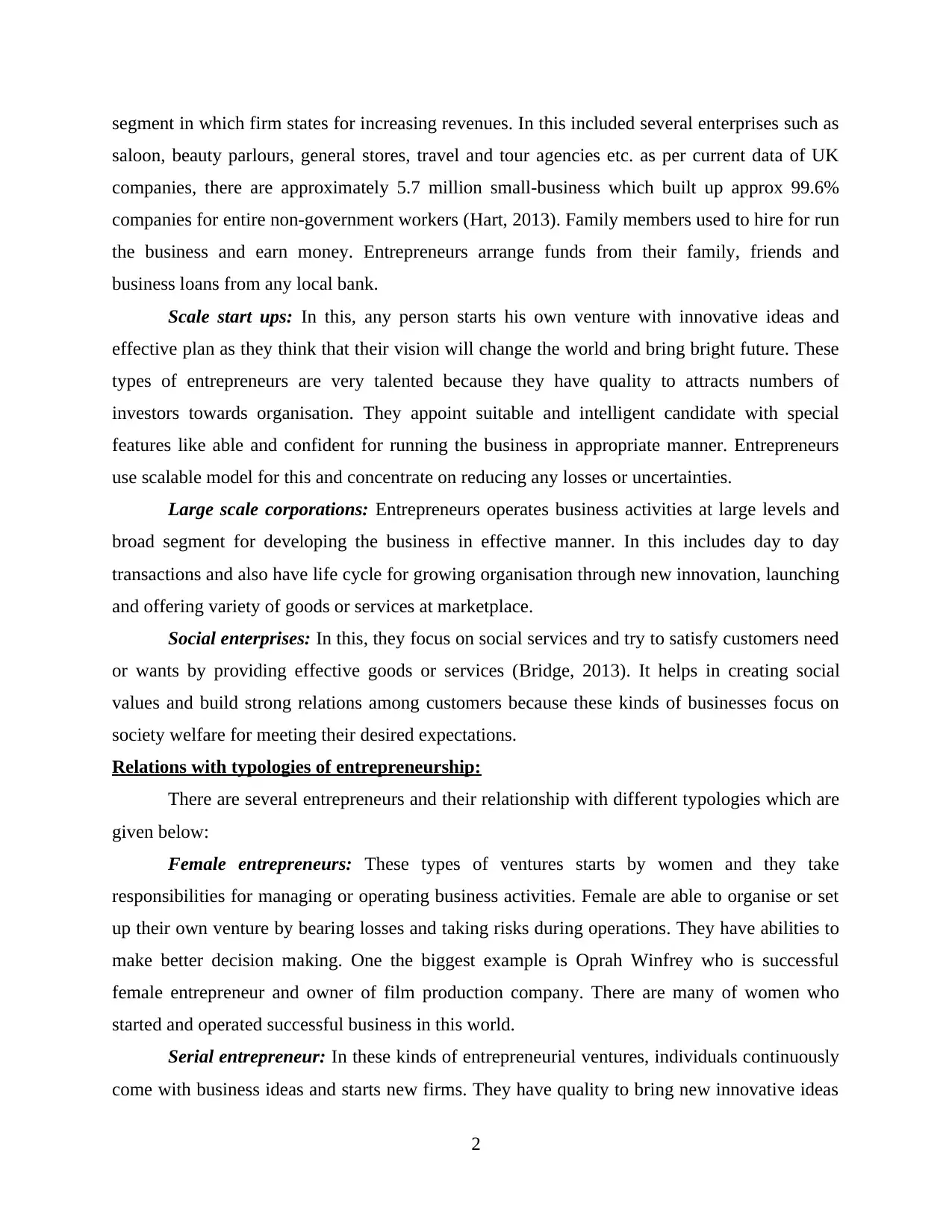
segment in which firm states for increasing revenues. In this included several enterprises such as
saloon, beauty parlours, general stores, travel and tour agencies etc. as per current data of UK
companies, there are approximately 5.7 million small-business which built up approx 99.6%
companies for entire non-government workers (Hart, 2013). Family members used to hire for run
the business and earn money. Entrepreneurs arrange funds from their family, friends and
business loans from any local bank.
Scale start ups: In this, any person starts his own venture with innovative ideas and
effective plan as they think that their vision will change the world and bring bright future. These
types of entrepreneurs are very talented because they have quality to attracts numbers of
investors towards organisation. They appoint suitable and intelligent candidate with special
features like able and confident for running the business in appropriate manner. Entrepreneurs
use scalable model for this and concentrate on reducing any losses or uncertainties.
Large scale corporations: Entrepreneurs operates business activities at large levels and
broad segment for developing the business in effective manner. In this includes day to day
transactions and also have life cycle for growing organisation through new innovation, launching
and offering variety of goods or services at marketplace.
Social enterprises: In this, they focus on social services and try to satisfy customers need
or wants by providing effective goods or services (Bridge, 2013). It helps in creating social
values and build strong relations among customers because these kinds of businesses focus on
society welfare for meeting their desired expectations.
Relations with typologies of entrepreneurship:
There are several entrepreneurs and their relationship with different typologies which are
given below:
Female entrepreneurs: These types of ventures starts by women and they take
responsibilities for managing or operating business activities. Female are able to organise or set
up their own venture by bearing losses and taking risks during operations. They have abilities to
make better decision making. One the biggest example is Oprah Winfrey who is successful
female entrepreneur and owner of film production company. There are many of women who
started and operated successful business in this world.
Serial entrepreneur: In these kinds of entrepreneurial ventures, individuals continuously
come with business ideas and starts new firms. They have quality to bring new innovative ideas
2
saloon, beauty parlours, general stores, travel and tour agencies etc. as per current data of UK
companies, there are approximately 5.7 million small-business which built up approx 99.6%
companies for entire non-government workers (Hart, 2013). Family members used to hire for run
the business and earn money. Entrepreneurs arrange funds from their family, friends and
business loans from any local bank.
Scale start ups: In this, any person starts his own venture with innovative ideas and
effective plan as they think that their vision will change the world and bring bright future. These
types of entrepreneurs are very talented because they have quality to attracts numbers of
investors towards organisation. They appoint suitable and intelligent candidate with special
features like able and confident for running the business in appropriate manner. Entrepreneurs
use scalable model for this and concentrate on reducing any losses or uncertainties.
Large scale corporations: Entrepreneurs operates business activities at large levels and
broad segment for developing the business in effective manner. In this includes day to day
transactions and also have life cycle for growing organisation through new innovation, launching
and offering variety of goods or services at marketplace.
Social enterprises: In this, they focus on social services and try to satisfy customers need
or wants by providing effective goods or services (Bridge, 2013). It helps in creating social
values and build strong relations among customers because these kinds of businesses focus on
society welfare for meeting their desired expectations.
Relations with typologies of entrepreneurship:
There are several entrepreneurs and their relationship with different typologies which are
given below:
Female entrepreneurs: These types of ventures starts by women and they take
responsibilities for managing or operating business activities. Female are able to organise or set
up their own venture by bearing losses and taking risks during operations. They have abilities to
make better decision making. One the biggest example is Oprah Winfrey who is successful
female entrepreneur and owner of film production company. There are many of women who
started and operated successful business in this world.
Serial entrepreneur: In these kinds of entrepreneurial ventures, individuals continuously
come with business ideas and starts new firms. They have quality to bring new innovative ideas
2
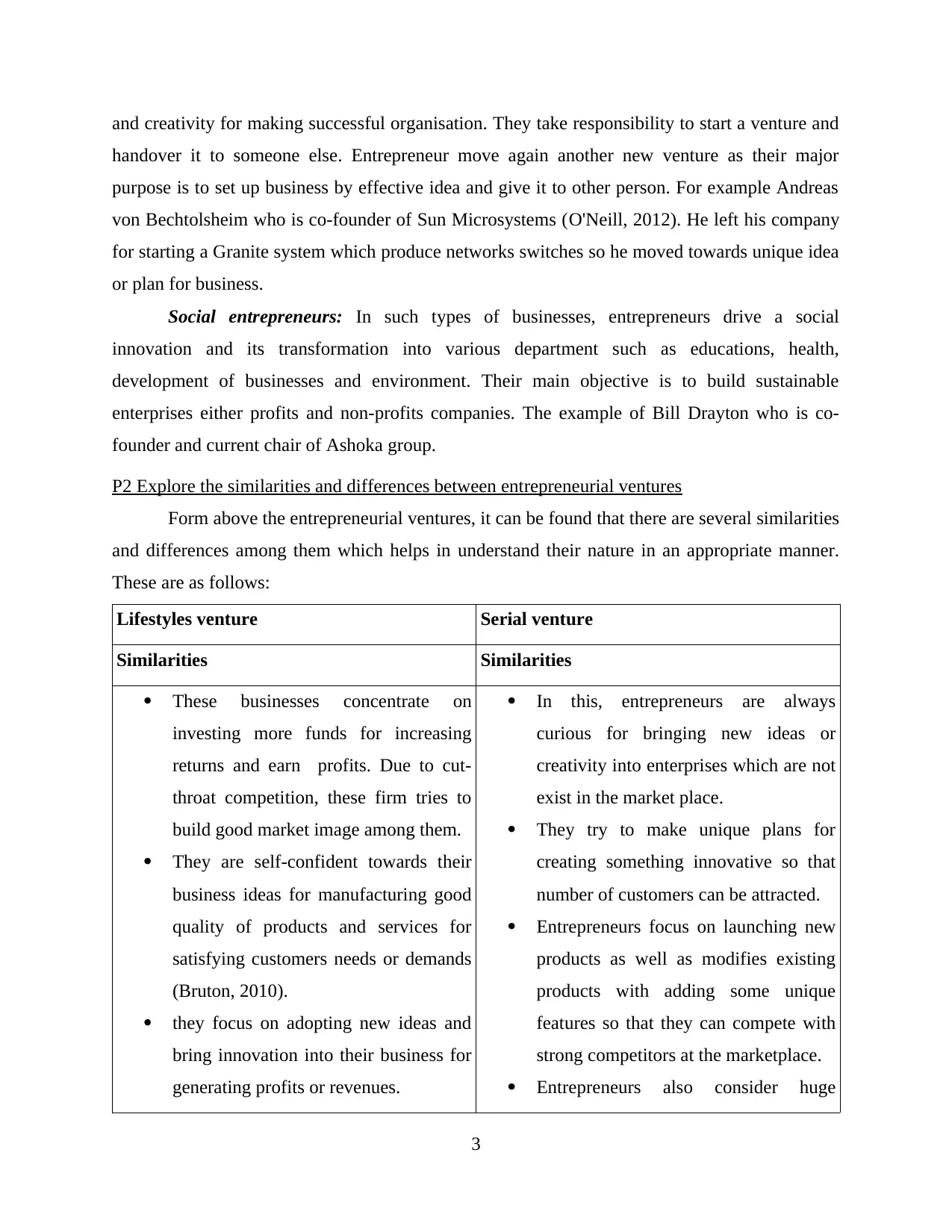
and creativity for making successful organisation. They take responsibility to start a venture and
handover it to someone else. Entrepreneur move again another new venture as their major
purpose is to set up business by effective idea and give it to other person. For example Andreas
von Bechtolsheim who is co-founder of Sun Microsystems (O'Neill, 2012). He left his company
for starting a Granite system which produce networks switches so he moved towards unique idea
or plan for business.
Social entrepreneurs: In such types of businesses, entrepreneurs drive a social
innovation and its transformation into various department such as educations, health,
development of businesses and environment. Their main objective is to build sustainable
enterprises either profits and non-profits companies. The example of Bill Drayton who is co-
founder and current chair of Ashoka group.
P2 Explore the similarities and differences between entrepreneurial ventures
Form above the entrepreneurial ventures, it can be found that there are several similarities
and differences among them which helps in understand their nature in an appropriate manner.
These are as follows:
Lifestyles venture Serial venture
Similarities Similarities
These businesses concentrate on
investing more funds for increasing
returns and earn profits. Due to cut-
throat competition, these firm tries to
build good market image among them.
They are self-confident towards their
business ideas for manufacturing good
quality of products and services for
satisfying customers needs or demands
(Bruton, 2010).
they focus on adopting new ideas and
bring innovation into their business for
generating profits or revenues.
In this, entrepreneurs are always
curious for bringing new ideas or
creativity into enterprises which are not
exist in the market place.
They try to make unique plans for
creating something innovative so that
number of customers can be attracted.
Entrepreneurs focus on launching new
products as well as modifies existing
products with adding some unique
features so that they can compete with
strong competitors at the marketplace.
Entrepreneurs also consider huge
3
handover it to someone else. Entrepreneur move again another new venture as their major
purpose is to set up business by effective idea and give it to other person. For example Andreas
von Bechtolsheim who is co-founder of Sun Microsystems (O'Neill, 2012). He left his company
for starting a Granite system which produce networks switches so he moved towards unique idea
or plan for business.
Social entrepreneurs: In such types of businesses, entrepreneurs drive a social
innovation and its transformation into various department such as educations, health,
development of businesses and environment. Their main objective is to build sustainable
enterprises either profits and non-profits companies. The example of Bill Drayton who is co-
founder and current chair of Ashoka group.
P2 Explore the similarities and differences between entrepreneurial ventures
Form above the entrepreneurial ventures, it can be found that there are several similarities
and differences among them which helps in understand their nature in an appropriate manner.
These are as follows:
Lifestyles venture Serial venture
Similarities Similarities
These businesses concentrate on
investing more funds for increasing
returns and earn profits. Due to cut-
throat competition, these firm tries to
build good market image among them.
They are self-confident towards their
business ideas for manufacturing good
quality of products and services for
satisfying customers needs or demands
(Bruton, 2010).
they focus on adopting new ideas and
bring innovation into their business for
generating profits or revenues.
In this, entrepreneurs are always
curious for bringing new ideas or
creativity into enterprises which are not
exist in the market place.
They try to make unique plans for
creating something innovative so that
number of customers can be attracted.
Entrepreneurs focus on launching new
products as well as modifies existing
products with adding some unique
features so that they can compete with
strong competitors at the marketplace.
Entrepreneurs also consider huge
3
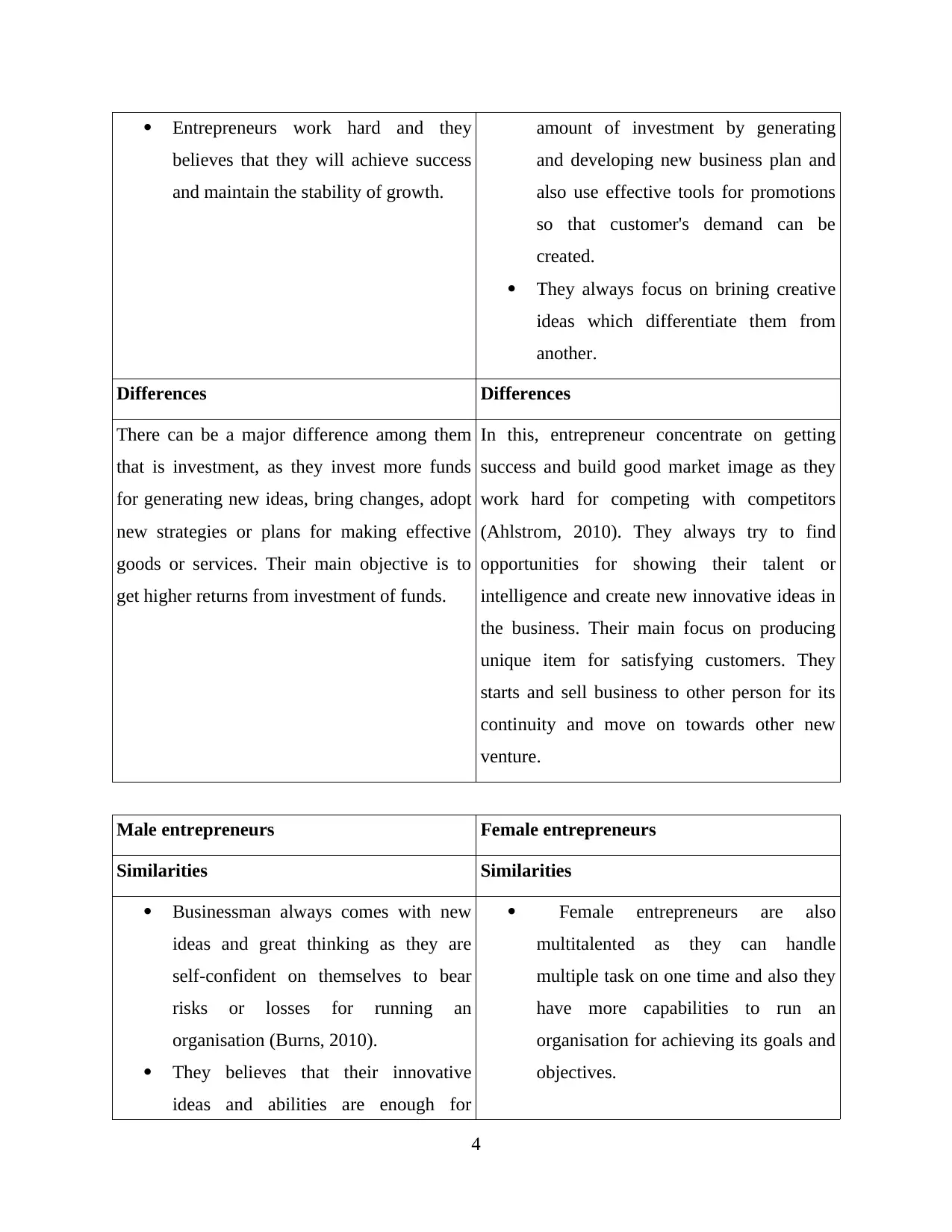
Entrepreneurs work hard and they
believes that they will achieve success
and maintain the stability of growth.
amount of investment by generating
and developing new business plan and
also use effective tools for promotions
so that customer's demand can be
created.
They always focus on brining creative
ideas which differentiate them from
another.
Differences Differences
There can be a major difference among them
that is investment, as they invest more funds
for generating new ideas, bring changes, adopt
new strategies or plans for making effective
goods or services. Their main objective is to
get higher returns from investment of funds.
In this, entrepreneur concentrate on getting
success and build good market image as they
work hard for competing with competitors
(Ahlstrom, 2010). They always try to find
opportunities for showing their talent or
intelligence and create new innovative ideas in
the business. Their main focus on producing
unique item for satisfying customers. They
starts and sell business to other person for its
continuity and move on towards other new
venture.
Male entrepreneurs Female entrepreneurs
Similarities Similarities
Businessman always comes with new
ideas and great thinking as they are
self-confident on themselves to bear
risks or losses for running an
organisation (Burns, 2010).
They believes that their innovative
ideas and abilities are enough for
Female entrepreneurs are also
multitalented as they can handle
multiple task on one time and also they
have more capabilities to run an
organisation for achieving its goals and
objectives.
4
believes that they will achieve success
and maintain the stability of growth.
amount of investment by generating
and developing new business plan and
also use effective tools for promotions
so that customer's demand can be
created.
They always focus on brining creative
ideas which differentiate them from
another.
Differences Differences
There can be a major difference among them
that is investment, as they invest more funds
for generating new ideas, bring changes, adopt
new strategies or plans for making effective
goods or services. Their main objective is to
get higher returns from investment of funds.
In this, entrepreneur concentrate on getting
success and build good market image as they
work hard for competing with competitors
(Ahlstrom, 2010). They always try to find
opportunities for showing their talent or
intelligence and create new innovative ideas in
the business. Their main focus on producing
unique item for satisfying customers. They
starts and sell business to other person for its
continuity and move on towards other new
venture.
Male entrepreneurs Female entrepreneurs
Similarities Similarities
Businessman always comes with new
ideas and great thinking as they are
self-confident on themselves to bear
risks or losses for running an
organisation (Burns, 2010).
They believes that their innovative
ideas and abilities are enough for
Female entrepreneurs are also
multitalented as they can handle
multiple task on one time and also they
have more capabilities to run an
organisation for achieving its goals and
objectives.
4
Paraphrase This Document
Need a fresh take? Get an instant paraphrase of this document with our AI Paraphraser
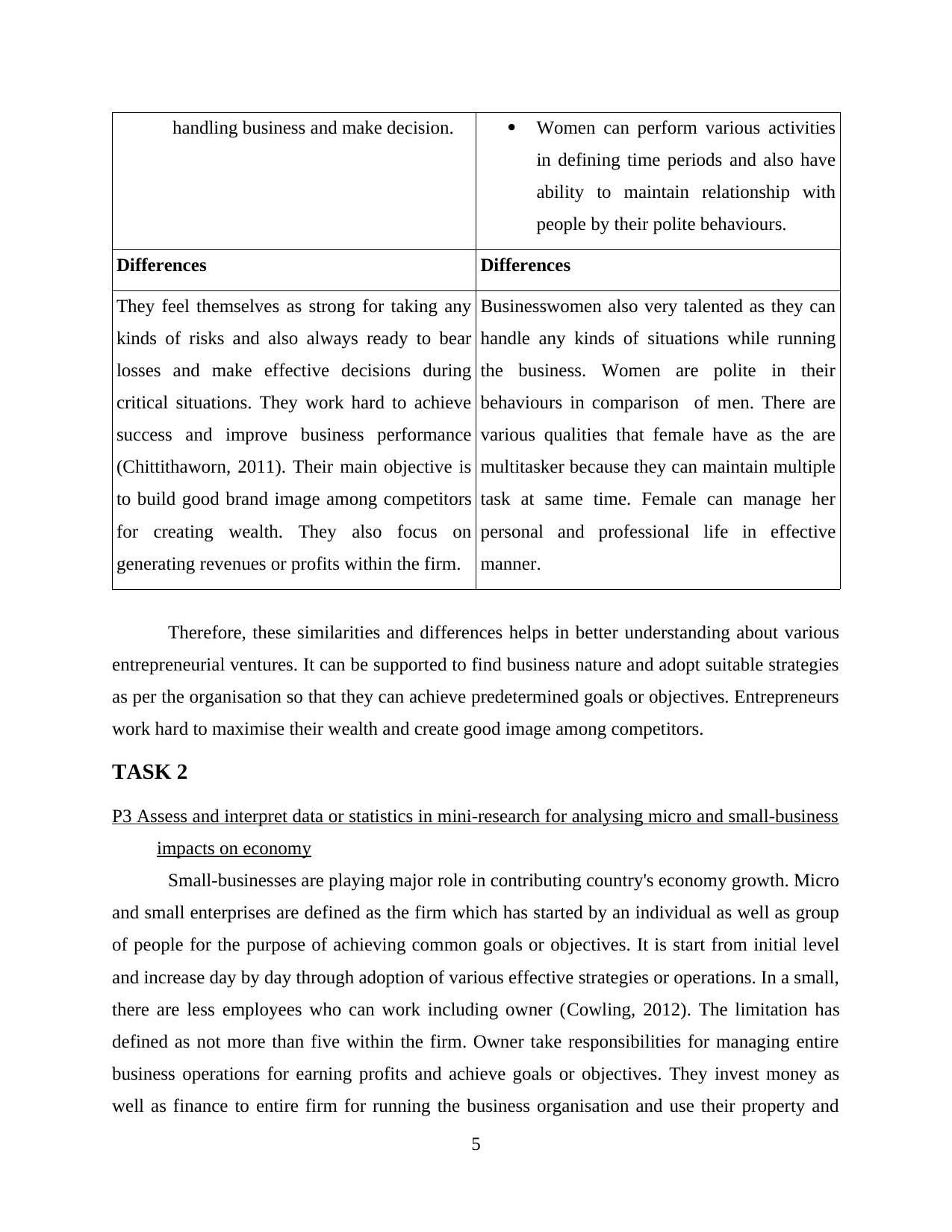
handling business and make decision. Women can perform various activities
in defining time periods and also have
ability to maintain relationship with
people by their polite behaviours.
Differences Differences
They feel themselves as strong for taking any
kinds of risks and also always ready to bear
losses and make effective decisions during
critical situations. They work hard to achieve
success and improve business performance
(Chittithaworn, 2011). Their main objective is
to build good brand image among competitors
for creating wealth. They also focus on
generating revenues or profits within the firm.
Businesswomen also very talented as they can
handle any kinds of situations while running
the business. Women are polite in their
behaviours in comparison of men. There are
various qualities that female have as the are
multitasker because they can maintain multiple
task at same time. Female can manage her
personal and professional life in effective
manner.
Therefore, these similarities and differences helps in better understanding about various
entrepreneurial ventures. It can be supported to find business nature and adopt suitable strategies
as per the organisation so that they can achieve predetermined goals or objectives. Entrepreneurs
work hard to maximise their wealth and create good image among competitors.
TASK 2
P3 Assess and interpret data or statistics in mini-research for analysing micro and small-business
impacts on economy
Small-businesses are playing major role in contributing country's economy growth. Micro
and small enterprises are defined as the firm which has started by an individual as well as group
of people for the purpose of achieving common goals or objectives. It is start from initial level
and increase day by day through adoption of various effective strategies or operations. In a small,
there are less employees who can work including owner (Cowling, 2012). The limitation has
defined as not more than five within the firm. Owner take responsibilities for managing entire
business operations for earning profits and achieve goals or objectives. They invest money as
well as finance to entire firm for running the business organisation and use their property and
5
in defining time periods and also have
ability to maintain relationship with
people by their polite behaviours.
Differences Differences
They feel themselves as strong for taking any
kinds of risks and also always ready to bear
losses and make effective decisions during
critical situations. They work hard to achieve
success and improve business performance
(Chittithaworn, 2011). Their main objective is
to build good brand image among competitors
for creating wealth. They also focus on
generating revenues or profits within the firm.
Businesswomen also very talented as they can
handle any kinds of situations while running
the business. Women are polite in their
behaviours in comparison of men. There are
various qualities that female have as the are
multitasker because they can maintain multiple
task at same time. Female can manage her
personal and professional life in effective
manner.
Therefore, these similarities and differences helps in better understanding about various
entrepreneurial ventures. It can be supported to find business nature and adopt suitable strategies
as per the organisation so that they can achieve predetermined goals or objectives. Entrepreneurs
work hard to maximise their wealth and create good image among competitors.
TASK 2
P3 Assess and interpret data or statistics in mini-research for analysing micro and small-business
impacts on economy
Small-businesses are playing major role in contributing country's economy growth. Micro
and small enterprises are defined as the firm which has started by an individual as well as group
of people for the purpose of achieving common goals or objectives. It is start from initial level
and increase day by day through adoption of various effective strategies or operations. In a small,
there are less employees who can work including owner (Cowling, 2012). The limitation has
defined as not more than five within the firm. Owner take responsibilities for managing entire
business operations for earning profits and achieve goals or objectives. They invest money as
well as finance to entire firm for running the business organisation and use their property and
5
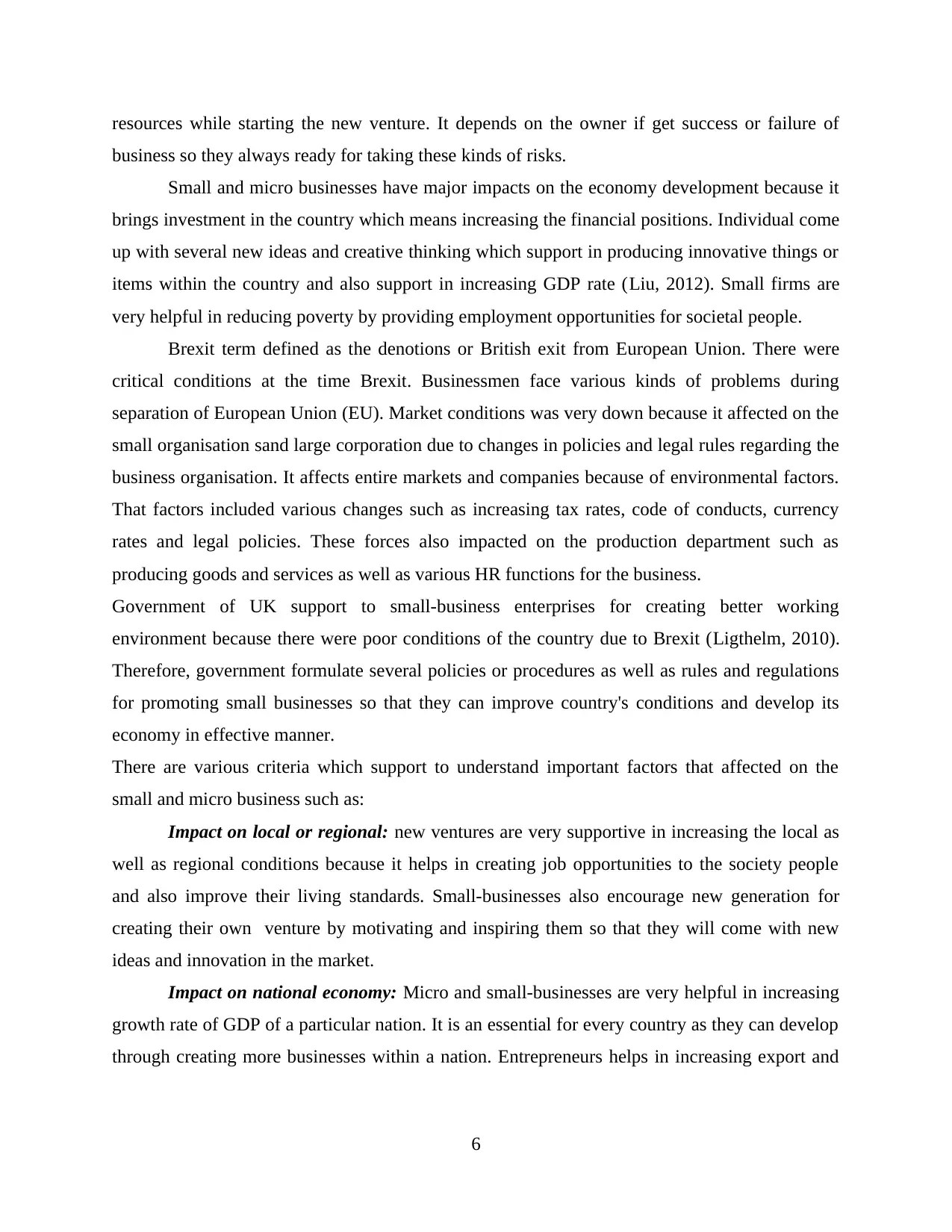
resources while starting the new venture. It depends on the owner if get success or failure of
business so they always ready for taking these kinds of risks.
Small and micro businesses have major impacts on the economy development because it
brings investment in the country which means increasing the financial positions. Individual come
up with several new ideas and creative thinking which support in producing innovative things or
items within the country and also support in increasing GDP rate (Liu, 2012). Small firms are
very helpful in reducing poverty by providing employment opportunities for societal people.
Brexit term defined as the denotions or British exit from European Union. There were
critical conditions at the time Brexit. Businessmen face various kinds of problems during
separation of European Union (EU). Market conditions was very down because it affected on the
small organisation sand large corporation due to changes in policies and legal rules regarding the
business organisation. It affects entire markets and companies because of environmental factors.
That factors included various changes such as increasing tax rates, code of conducts, currency
rates and legal policies. These forces also impacted on the production department such as
producing goods and services as well as various HR functions for the business.
Government of UK support to small-business enterprises for creating better working
environment because there were poor conditions of the country due to Brexit (Ligthelm, 2010).
Therefore, government formulate several policies or procedures as well as rules and regulations
for promoting small businesses so that they can improve country's conditions and develop its
economy in effective manner.
There are various criteria which support to understand important factors that affected on the
small and micro business such as:
Impact on local or regional: new ventures are very supportive in increasing the local as
well as regional conditions because it helps in creating job opportunities to the society people
and also improve their living standards. Small-businesses also encourage new generation for
creating their own venture by motivating and inspiring them so that they will come with new
ideas and innovation in the market.
Impact on national economy: Micro and small-businesses are very helpful in increasing
growth rate of GDP of a particular nation. It is an essential for every country as they can develop
through creating more businesses within a nation. Entrepreneurs helps in increasing export and
6
business so they always ready for taking these kinds of risks.
Small and micro businesses have major impacts on the economy development because it
brings investment in the country which means increasing the financial positions. Individual come
up with several new ideas and creative thinking which support in producing innovative things or
items within the country and also support in increasing GDP rate (Liu, 2012). Small firms are
very helpful in reducing poverty by providing employment opportunities for societal people.
Brexit term defined as the denotions or British exit from European Union. There were
critical conditions at the time Brexit. Businessmen face various kinds of problems during
separation of European Union (EU). Market conditions was very down because it affected on the
small organisation sand large corporation due to changes in policies and legal rules regarding the
business organisation. It affects entire markets and companies because of environmental factors.
That factors included various changes such as increasing tax rates, code of conducts, currency
rates and legal policies. These forces also impacted on the production department such as
producing goods and services as well as various HR functions for the business.
Government of UK support to small-business enterprises for creating better working
environment because there were poor conditions of the country due to Brexit (Ligthelm, 2010).
Therefore, government formulate several policies or procedures as well as rules and regulations
for promoting small businesses so that they can improve country's conditions and develop its
economy in effective manner.
There are various criteria which support to understand important factors that affected on the
small and micro business such as:
Impact on local or regional: new ventures are very supportive in increasing the local as
well as regional conditions because it helps in creating job opportunities to the society people
and also improve their living standards. Small-businesses also encourage new generation for
creating their own venture by motivating and inspiring them so that they will come with new
ideas and innovation in the market.
Impact on national economy: Micro and small-businesses are very helpful in increasing
growth rate of GDP of a particular nation. It is an essential for every country as they can develop
through creating more businesses within a nation. Entrepreneurs helps in increasing export and
6
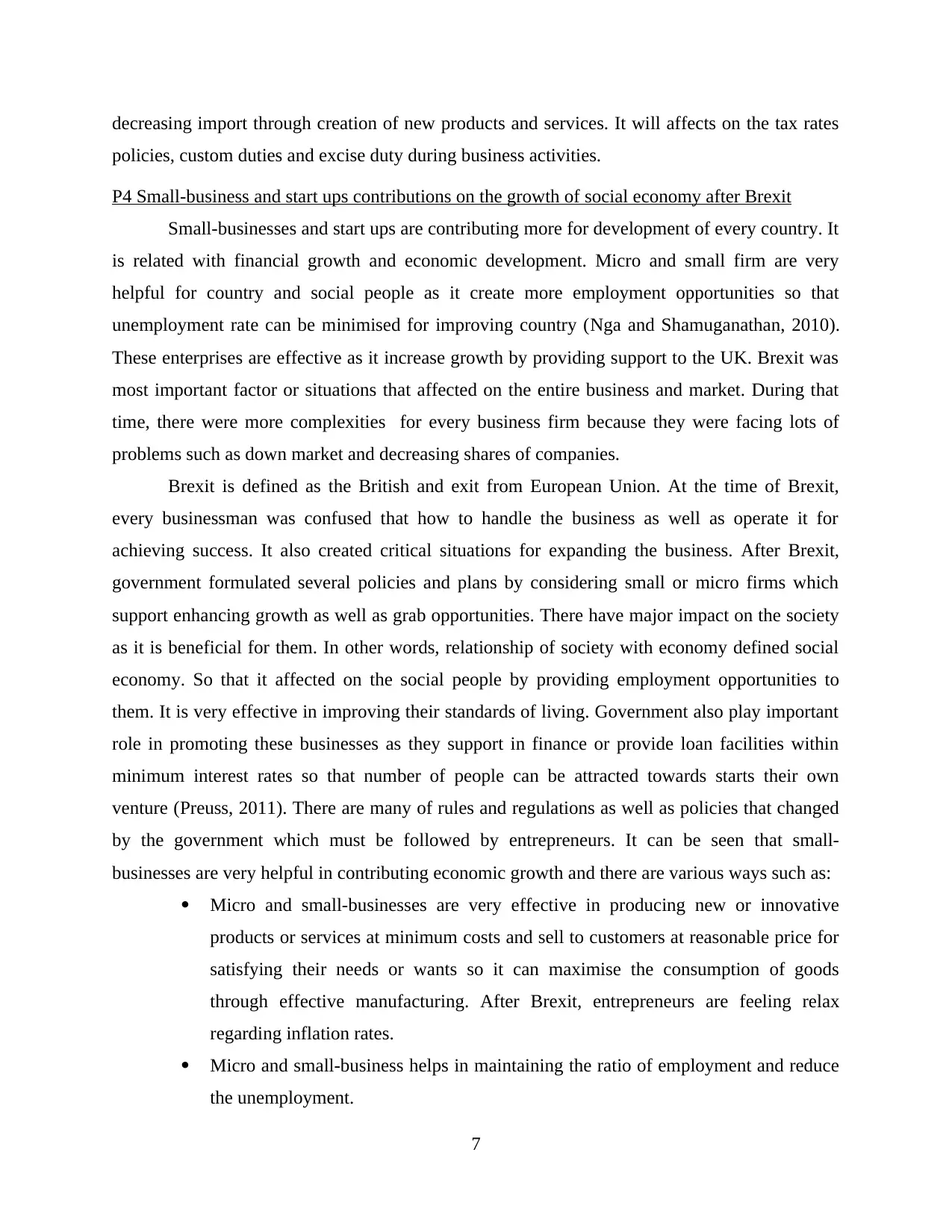
decreasing import through creation of new products and services. It will affects on the tax rates
policies, custom duties and excise duty during business activities.
P4 Small-business and start ups contributions on the growth of social economy after Brexit
Small-businesses and start ups are contributing more for development of every country. It
is related with financial growth and economic development. Micro and small firm are very
helpful for country and social people as it create more employment opportunities so that
unemployment rate can be minimised for improving country (Nga and Shamuganathan, 2010).
These enterprises are effective as it increase growth by providing support to the UK. Brexit was
most important factor or situations that affected on the entire business and market. During that
time, there were more complexities for every business firm because they were facing lots of
problems such as down market and decreasing shares of companies.
Brexit is defined as the British and exit from European Union. At the time of Brexit,
every businessman was confused that how to handle the business as well as operate it for
achieving success. It also created critical situations for expanding the business. After Brexit,
government formulated several policies and plans by considering small or micro firms which
support enhancing growth as well as grab opportunities. There have major impact on the society
as it is beneficial for them. In other words, relationship of society with economy defined social
economy. So that it affected on the social people by providing employment opportunities to
them. It is very effective in improving their standards of living. Government also play important
role in promoting these businesses as they support in finance or provide loan facilities within
minimum interest rates so that number of people can be attracted towards starts their own
venture (Preuss, 2011). There are many of rules and regulations as well as policies that changed
by the government which must be followed by entrepreneurs. It can be seen that small-
businesses are very helpful in contributing economic growth and there are various ways such as:
Micro and small-businesses are very effective in producing new or innovative
products or services at minimum costs and sell to customers at reasonable price for
satisfying their needs or wants so it can maximise the consumption of goods
through effective manufacturing. After Brexit, entrepreneurs are feeling relax
regarding inflation rates.
Micro and small-business helps in maintaining the ratio of employment and reduce
the unemployment.
7
policies, custom duties and excise duty during business activities.
P4 Small-business and start ups contributions on the growth of social economy after Brexit
Small-businesses and start ups are contributing more for development of every country. It
is related with financial growth and economic development. Micro and small firm are very
helpful for country and social people as it create more employment opportunities so that
unemployment rate can be minimised for improving country (Nga and Shamuganathan, 2010).
These enterprises are effective as it increase growth by providing support to the UK. Brexit was
most important factor or situations that affected on the entire business and market. During that
time, there were more complexities for every business firm because they were facing lots of
problems such as down market and decreasing shares of companies.
Brexit is defined as the British and exit from European Union. At the time of Brexit,
every businessman was confused that how to handle the business as well as operate it for
achieving success. It also created critical situations for expanding the business. After Brexit,
government formulated several policies and plans by considering small or micro firms which
support enhancing growth as well as grab opportunities. There have major impact on the society
as it is beneficial for them. In other words, relationship of society with economy defined social
economy. So that it affected on the social people by providing employment opportunities to
them. It is very effective in improving their standards of living. Government also play important
role in promoting these businesses as they support in finance or provide loan facilities within
minimum interest rates so that number of people can be attracted towards starts their own
venture (Preuss, 2011). There are many of rules and regulations as well as policies that changed
by the government which must be followed by entrepreneurs. It can be seen that small-
businesses are very helpful in contributing economic growth and there are various ways such as:
Micro and small-businesses are very effective in producing new or innovative
products or services at minimum costs and sell to customers at reasonable price for
satisfying their needs or wants so it can maximise the consumption of goods
through effective manufacturing. After Brexit, entrepreneurs are feeling relax
regarding inflation rates.
Micro and small-business helps in maintaining the ratio of employment and reduce
the unemployment.
7
Secure Best Marks with AI Grader
Need help grading? Try our AI Grader for instant feedback on your assignments.
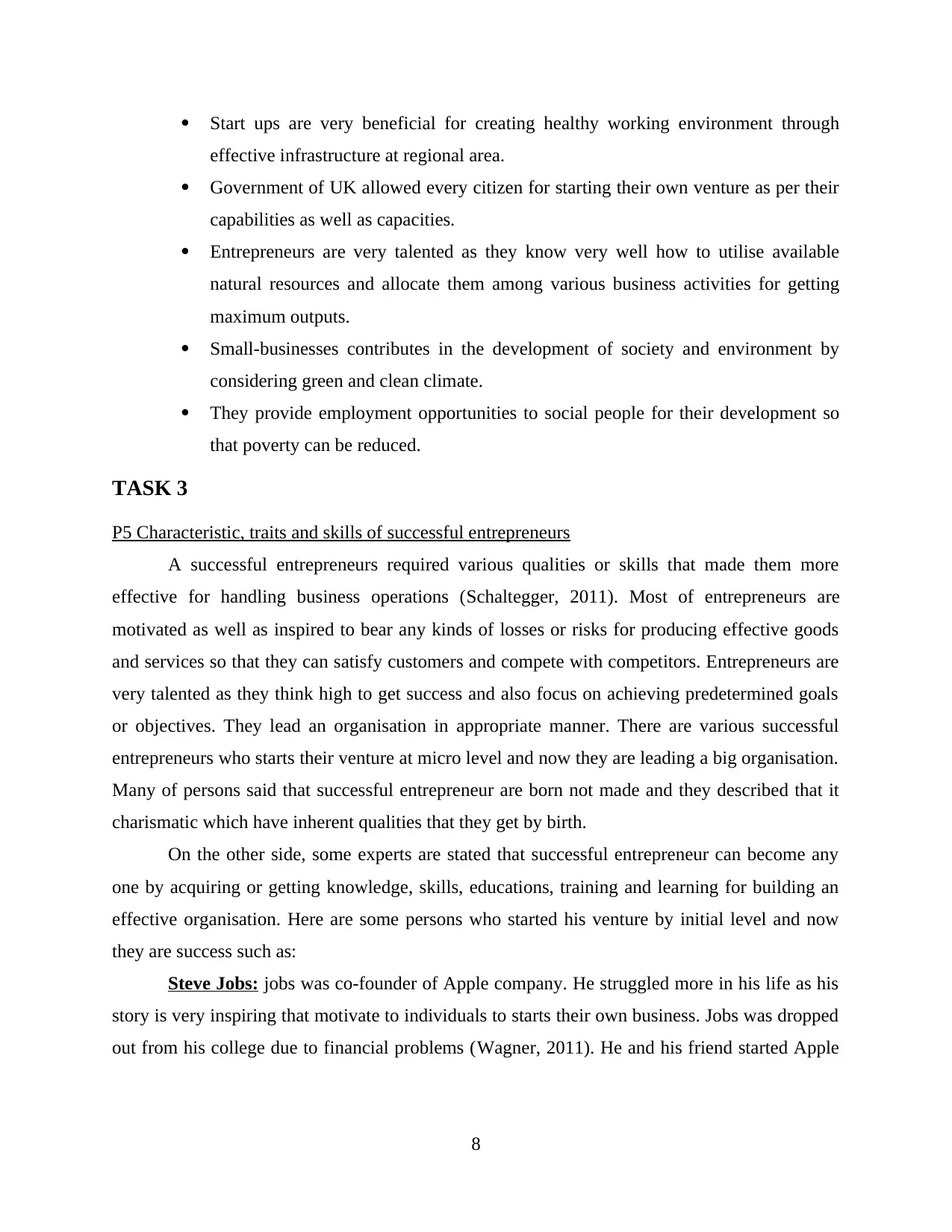
Start ups are very beneficial for creating healthy working environment through
effective infrastructure at regional area.
Government of UK allowed every citizen for starting their own venture as per their
capabilities as well as capacities.
Entrepreneurs are very talented as they know very well how to utilise available
natural resources and allocate them among various business activities for getting
maximum outputs.
Small-businesses contributes in the development of society and environment by
considering green and clean climate.
They provide employment opportunities to social people for their development so
that poverty can be reduced.
TASK 3
P5 Characteristic, traits and skills of successful entrepreneurs
A successful entrepreneurs required various qualities or skills that made them more
effective for handling business operations (Schaltegger, 2011). Most of entrepreneurs are
motivated as well as inspired to bear any kinds of losses or risks for producing effective goods
and services so that they can satisfy customers and compete with competitors. Entrepreneurs are
very talented as they think high to get success and also focus on achieving predetermined goals
or objectives. They lead an organisation in appropriate manner. There are various successful
entrepreneurs who starts their venture at micro level and now they are leading a big organisation.
Many of persons said that successful entrepreneur are born not made and they described that it
charismatic which have inherent qualities that they get by birth.
On the other side, some experts are stated that successful entrepreneur can become any
one by acquiring or getting knowledge, skills, educations, training and learning for building an
effective organisation. Here are some persons who started his venture by initial level and now
they are success such as:
Steve Jobs: jobs was co-founder of Apple company. He struggled more in his life as his
story is very inspiring that motivate to individuals to starts their own business. Jobs was dropped
out from his college due to financial problems (Wagner, 2011). He and his friend started Apple
8
effective infrastructure at regional area.
Government of UK allowed every citizen for starting their own venture as per their
capabilities as well as capacities.
Entrepreneurs are very talented as they know very well how to utilise available
natural resources and allocate them among various business activities for getting
maximum outputs.
Small-businesses contributes in the development of society and environment by
considering green and clean climate.
They provide employment opportunities to social people for their development so
that poverty can be reduced.
TASK 3
P5 Characteristic, traits and skills of successful entrepreneurs
A successful entrepreneurs required various qualities or skills that made them more
effective for handling business operations (Schaltegger, 2011). Most of entrepreneurs are
motivated as well as inspired to bear any kinds of losses or risks for producing effective goods
and services so that they can satisfy customers and compete with competitors. Entrepreneurs are
very talented as they think high to get success and also focus on achieving predetermined goals
or objectives. They lead an organisation in appropriate manner. There are various successful
entrepreneurs who starts their venture at micro level and now they are leading a big organisation.
Many of persons said that successful entrepreneur are born not made and they described that it
charismatic which have inherent qualities that they get by birth.
On the other side, some experts are stated that successful entrepreneur can become any
one by acquiring or getting knowledge, skills, educations, training and learning for building an
effective organisation. Here are some persons who started his venture by initial level and now
they are success such as:
Steve Jobs: jobs was co-founder of Apple company. He struggled more in his life as his
story is very inspiring that motivate to individuals to starts their own business. Jobs was dropped
out from his college due to financial problems (Wagner, 2011). He and his friend started Apple
8
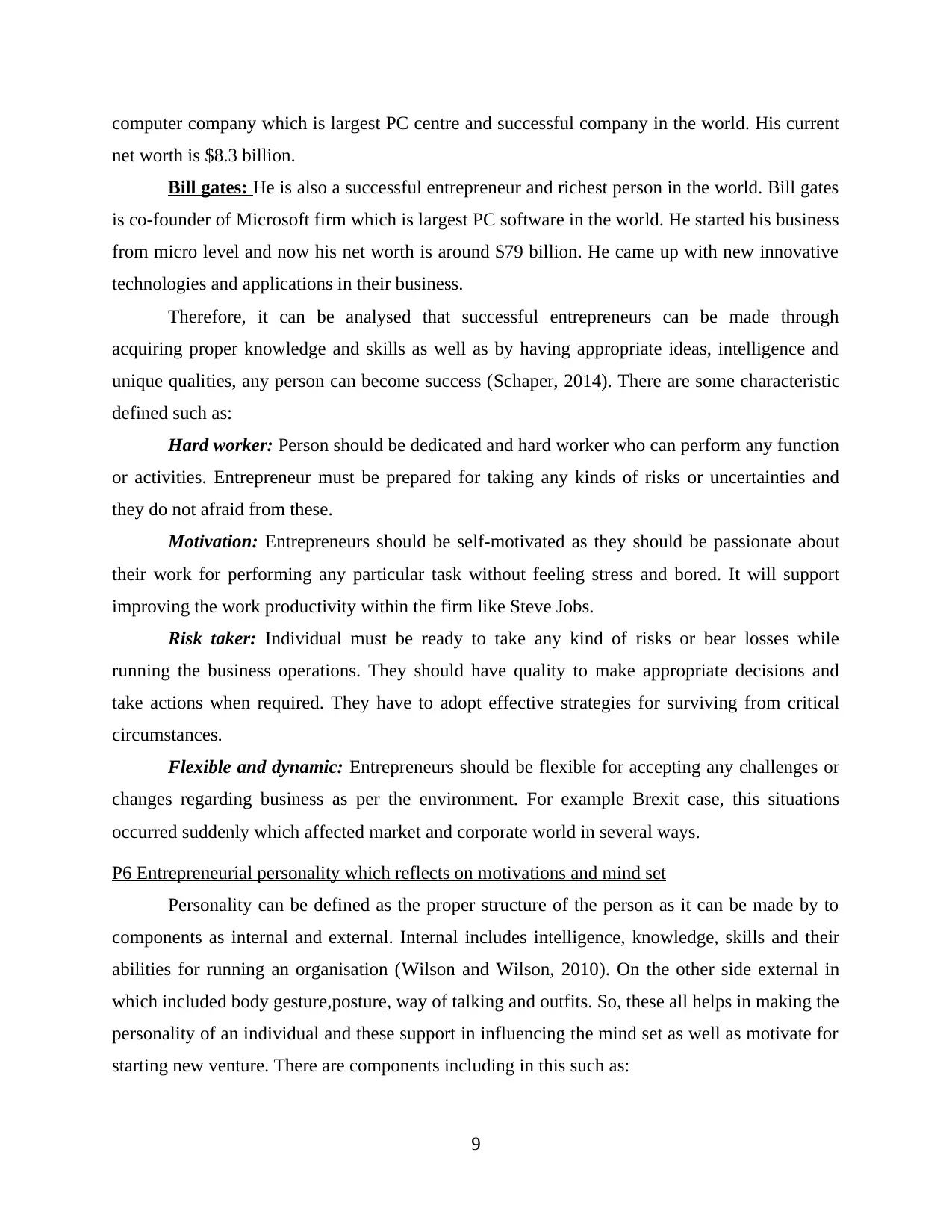
computer company which is largest PC centre and successful company in the world. His current
net worth is $8.3 billion.
Bill gates: He is also a successful entrepreneur and richest person in the world. Bill gates
is co-founder of Microsoft firm which is largest PC software in the world. He started his business
from micro level and now his net worth is around $79 billion. He came up with new innovative
technologies and applications in their business.
Therefore, it can be analysed that successful entrepreneurs can be made through
acquiring proper knowledge and skills as well as by having appropriate ideas, intelligence and
unique qualities, any person can become success (Schaper, 2014). There are some characteristic
defined such as:
Hard worker: Person should be dedicated and hard worker who can perform any function
or activities. Entrepreneur must be prepared for taking any kinds of risks or uncertainties and
they do not afraid from these.
Motivation: Entrepreneurs should be self-motivated as they should be passionate about
their work for performing any particular task without feeling stress and bored. It will support
improving the work productivity within the firm like Steve Jobs.
Risk taker: Individual must be ready to take any kind of risks or bear losses while
running the business operations. They should have quality to make appropriate decisions and
take actions when required. They have to adopt effective strategies for surviving from critical
circumstances.
Flexible and dynamic: Entrepreneurs should be flexible for accepting any challenges or
changes regarding business as per the environment. For example Brexit case, this situations
occurred suddenly which affected market and corporate world in several ways.
P6 Entrepreneurial personality which reflects on motivations and mind set
Personality can be defined as the proper structure of the person as it can be made by to
components as internal and external. Internal includes intelligence, knowledge, skills and their
abilities for running an organisation (Wilson and Wilson, 2010). On the other side external in
which included body gesture,posture, way of talking and outfits. So, these all helps in making the
personality of an individual and these support in influencing the mind set as well as motivate for
starting new venture. There are components including in this such as:
9
net worth is $8.3 billion.
Bill gates: He is also a successful entrepreneur and richest person in the world. Bill gates
is co-founder of Microsoft firm which is largest PC software in the world. He started his business
from micro level and now his net worth is around $79 billion. He came up with new innovative
technologies and applications in their business.
Therefore, it can be analysed that successful entrepreneurs can be made through
acquiring proper knowledge and skills as well as by having appropriate ideas, intelligence and
unique qualities, any person can become success (Schaper, 2014). There are some characteristic
defined such as:
Hard worker: Person should be dedicated and hard worker who can perform any function
or activities. Entrepreneur must be prepared for taking any kinds of risks or uncertainties and
they do not afraid from these.
Motivation: Entrepreneurs should be self-motivated as they should be passionate about
their work for performing any particular task without feeling stress and bored. It will support
improving the work productivity within the firm like Steve Jobs.
Risk taker: Individual must be ready to take any kind of risks or bear losses while
running the business operations. They should have quality to make appropriate decisions and
take actions when required. They have to adopt effective strategies for surviving from critical
circumstances.
Flexible and dynamic: Entrepreneurs should be flexible for accepting any challenges or
changes regarding business as per the environment. For example Brexit case, this situations
occurred suddenly which affected market and corporate world in several ways.
P6 Entrepreneurial personality which reflects on motivations and mind set
Personality can be defined as the proper structure of the person as it can be made by to
components as internal and external. Internal includes intelligence, knowledge, skills and their
abilities for running an organisation (Wilson and Wilson, 2010). On the other side external in
which included body gesture,posture, way of talking and outfits. So, these all helps in making the
personality of an individual and these support in influencing the mind set as well as motivate for
starting new venture. There are components including in this such as:
9
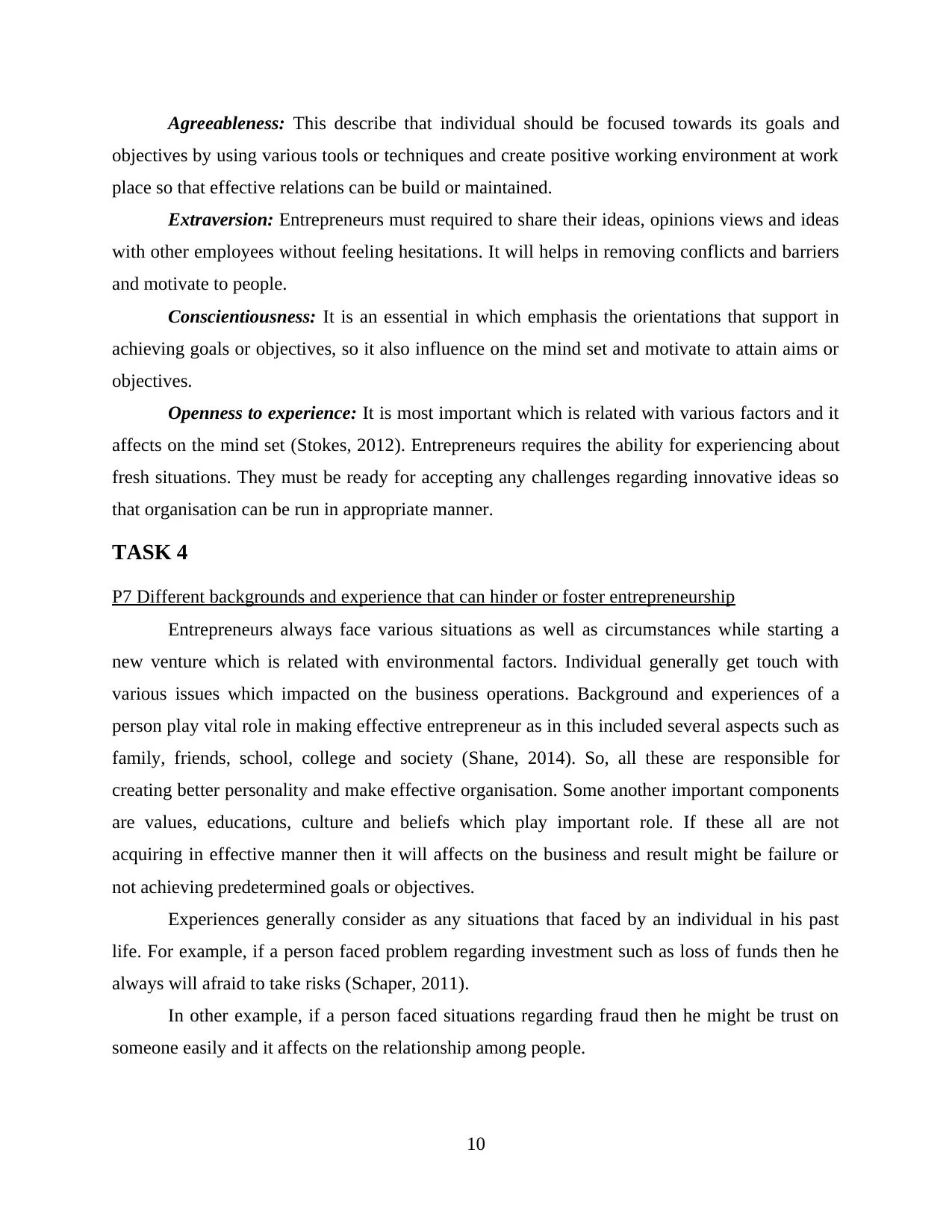
Agreeableness: This describe that individual should be focused towards its goals and
objectives by using various tools or techniques and create positive working environment at work
place so that effective relations can be build or maintained.
Extraversion: Entrepreneurs must required to share their ideas, opinions views and ideas
with other employees without feeling hesitations. It will helps in removing conflicts and barriers
and motivate to people.
Conscientiousness: It is an essential in which emphasis the orientations that support in
achieving goals or objectives, so it also influence on the mind set and motivate to attain aims or
objectives.
Openness to experience: It is most important which is related with various factors and it
affects on the mind set (Stokes, 2012). Entrepreneurs requires the ability for experiencing about
fresh situations. They must be ready for accepting any challenges regarding innovative ideas so
that organisation can be run in appropriate manner.
TASK 4
P7 Different backgrounds and experience that can hinder or foster entrepreneurship
Entrepreneurs always face various situations as well as circumstances while starting a
new venture which is related with environmental factors. Individual generally get touch with
various issues which impacted on the business operations. Background and experiences of a
person play vital role in making effective entrepreneur as in this included several aspects such as
family, friends, school, college and society (Shane, 2014). So, all these are responsible for
creating better personality and make effective organisation. Some another important components
are values, educations, culture and beliefs which play important role. If these all are not
acquiring in effective manner then it will affects on the business and result might be failure or
not achieving predetermined goals or objectives.
Experiences generally consider as any situations that faced by an individual in his past
life. For example, if a person faced problem regarding investment such as loss of funds then he
always will afraid to take risks (Schaper, 2011).
In other example, if a person faced situations regarding fraud then he might be trust on
someone easily and it affects on the relationship among people.
10
objectives by using various tools or techniques and create positive working environment at work
place so that effective relations can be build or maintained.
Extraversion: Entrepreneurs must required to share their ideas, opinions views and ideas
with other employees without feeling hesitations. It will helps in removing conflicts and barriers
and motivate to people.
Conscientiousness: It is an essential in which emphasis the orientations that support in
achieving goals or objectives, so it also influence on the mind set and motivate to attain aims or
objectives.
Openness to experience: It is most important which is related with various factors and it
affects on the mind set (Stokes, 2012). Entrepreneurs requires the ability for experiencing about
fresh situations. They must be ready for accepting any challenges regarding innovative ideas so
that organisation can be run in appropriate manner.
TASK 4
P7 Different backgrounds and experience that can hinder or foster entrepreneurship
Entrepreneurs always face various situations as well as circumstances while starting a
new venture which is related with environmental factors. Individual generally get touch with
various issues which impacted on the business operations. Background and experiences of a
person play vital role in making effective entrepreneur as in this included several aspects such as
family, friends, school, college and society (Shane, 2014). So, all these are responsible for
creating better personality and make effective organisation. Some another important components
are values, educations, culture and beliefs which play important role. If these all are not
acquiring in effective manner then it will affects on the business and result might be failure or
not achieving predetermined goals or objectives.
Experiences generally consider as any situations that faced by an individual in his past
life. For example, if a person faced problem regarding investment such as loss of funds then he
always will afraid to take risks (Schaper, 2011).
In other example, if a person faced situations regarding fraud then he might be trust on
someone easily and it affects on the relationship among people.
10
Paraphrase This Document
Need a fresh take? Get an instant paraphrase of this document with our AI Paraphraser
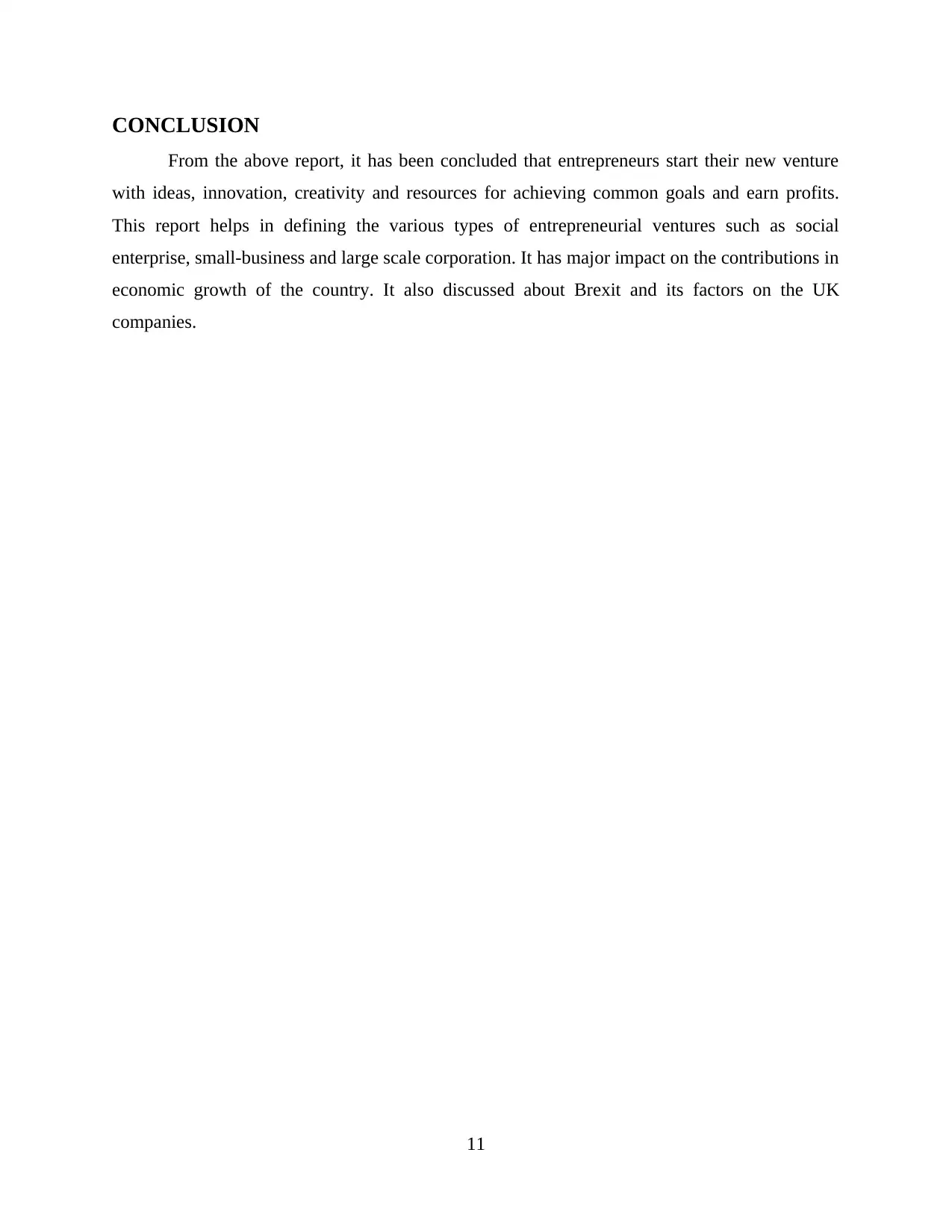
CONCLUSION
From the above report, it has been concluded that entrepreneurs start their new venture
with ideas, innovation, creativity and resources for achieving common goals and earn profits.
This report helps in defining the various types of entrepreneurial ventures such as social
enterprise, small-business and large scale corporation. It has major impact on the contributions in
economic growth of the country. It also discussed about Brexit and its factors on the UK
companies.
11
From the above report, it has been concluded that entrepreneurs start their new venture
with ideas, innovation, creativity and resources for achieving common goals and earn profits.
This report helps in defining the various types of entrepreneurial ventures such as social
enterprise, small-business and large scale corporation. It has major impact on the contributions in
economic growth of the country. It also discussed about Brexit and its factors on the UK
companies.
11
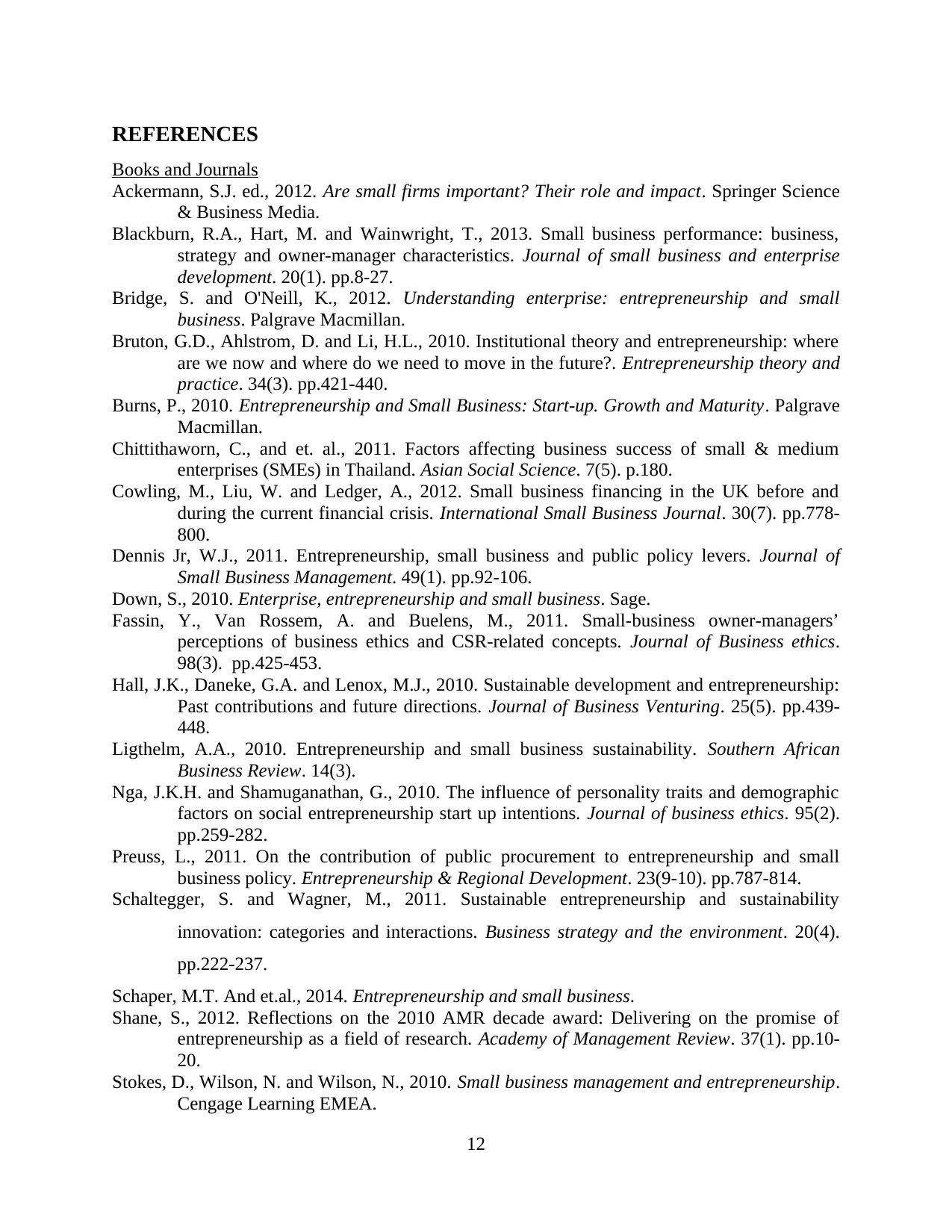
REFERENCES
Books and Journals
Ackermann, S.J. ed., 2012. Are small firms important? Their role and impact. Springer Science
& Business Media.
Blackburn, R.A., Hart, M. and Wainwright, T., 2013. Small business performance: business,
strategy and owner-manager characteristics. Journal of small business and enterprise
development. 20(1). pp.8-27.
Bridge, S. and O'Neill, K., 2012. Understanding enterprise: entrepreneurship and small
business. Palgrave Macmillan.
Bruton, G.D., Ahlstrom, D. and Li, H.L., 2010. Institutional theory and entrepreneurship: where
are we now and where do we need to move in the future?. Entrepreneurship theory and
practice. 34(3). pp.421-440.
Burns, P., 2010. Entrepreneurship and Small Business: Start-up. Growth and Maturity. Palgrave
Macmillan.
Chittithaworn, C., and et. al., 2011. Factors affecting business success of small & medium
enterprises (SMEs) in Thailand. Asian Social Science. 7(5). p.180.
Cowling, M., Liu, W. and Ledger, A., 2012. Small business financing in the UK before and
during the current financial crisis. International Small Business Journal. 30(7). pp.778-
800.
Dennis Jr, W.J., 2011. Entrepreneurship, small business and public policy levers. Journal of
Small Business Management. 49(1). pp.92-106.
Down, S., 2010. Enterprise, entrepreneurship and small business. Sage.
Fassin, Y., Van Rossem, A. and Buelens, M., 2011. Small-business owner-managers’
perceptions of business ethics and CSR-related concepts. Journal of Business ethics.
98(3). pp.425-453.
Hall, J.K., Daneke, G.A. and Lenox, M.J., 2010. Sustainable development and entrepreneurship:
Past contributions and future directions. Journal of Business Venturing. 25(5). pp.439-
448.
Ligthelm, A.A., 2010. Entrepreneurship and small business sustainability. Southern African
Business Review. 14(3).
Nga, J.K.H. and Shamuganathan, G., 2010. The influence of personality traits and demographic
factors on social entrepreneurship start up intentions. Journal of business ethics. 95(2).
pp.259-282.
Preuss, L., 2011. On the contribution of public procurement to entrepreneurship and small
business policy. Entrepreneurship & Regional Development. 23(9-10). pp.787-814.
Schaltegger, S. and Wagner, M., 2011. Sustainable entrepreneurship and sustainability
innovation: categories and interactions. Business strategy and the environment. 20(4).
pp.222-237.
Schaper, M.T. And et.al., 2014. Entrepreneurship and small business.
Shane, S., 2012. Reflections on the 2010 AMR decade award: Delivering on the promise of
entrepreneurship as a field of research. Academy of Management Review. 37(1). pp.10-
20.
Stokes, D., Wilson, N. and Wilson, N., 2010. Small business management and entrepreneurship.
Cengage Learning EMEA.
12
Books and Journals
Ackermann, S.J. ed., 2012. Are small firms important? Their role and impact. Springer Science
& Business Media.
Blackburn, R.A., Hart, M. and Wainwright, T., 2013. Small business performance: business,
strategy and owner-manager characteristics. Journal of small business and enterprise
development. 20(1). pp.8-27.
Bridge, S. and O'Neill, K., 2012. Understanding enterprise: entrepreneurship and small
business. Palgrave Macmillan.
Bruton, G.D., Ahlstrom, D. and Li, H.L., 2010. Institutional theory and entrepreneurship: where
are we now and where do we need to move in the future?. Entrepreneurship theory and
practice. 34(3). pp.421-440.
Burns, P., 2010. Entrepreneurship and Small Business: Start-up. Growth and Maturity. Palgrave
Macmillan.
Chittithaworn, C., and et. al., 2011. Factors affecting business success of small & medium
enterprises (SMEs) in Thailand. Asian Social Science. 7(5). p.180.
Cowling, M., Liu, W. and Ledger, A., 2012. Small business financing in the UK before and
during the current financial crisis. International Small Business Journal. 30(7). pp.778-
800.
Dennis Jr, W.J., 2011. Entrepreneurship, small business and public policy levers. Journal of
Small Business Management. 49(1). pp.92-106.
Down, S., 2010. Enterprise, entrepreneurship and small business. Sage.
Fassin, Y., Van Rossem, A. and Buelens, M., 2011. Small-business owner-managers’
perceptions of business ethics and CSR-related concepts. Journal of Business ethics.
98(3). pp.425-453.
Hall, J.K., Daneke, G.A. and Lenox, M.J., 2010. Sustainable development and entrepreneurship:
Past contributions and future directions. Journal of Business Venturing. 25(5). pp.439-
448.
Ligthelm, A.A., 2010. Entrepreneurship and small business sustainability. Southern African
Business Review. 14(3).
Nga, J.K.H. and Shamuganathan, G., 2010. The influence of personality traits and demographic
factors on social entrepreneurship start up intentions. Journal of business ethics. 95(2).
pp.259-282.
Preuss, L., 2011. On the contribution of public procurement to entrepreneurship and small
business policy. Entrepreneurship & Regional Development. 23(9-10). pp.787-814.
Schaltegger, S. and Wagner, M., 2011. Sustainable entrepreneurship and sustainability
innovation: categories and interactions. Business strategy and the environment. 20(4).
pp.222-237.
Schaper, M.T. And et.al., 2014. Entrepreneurship and small business.
Shane, S., 2012. Reflections on the 2010 AMR decade award: Delivering on the promise of
entrepreneurship as a field of research. Academy of Management Review. 37(1). pp.10-
20.
Stokes, D., Wilson, N. and Wilson, N., 2010. Small business management and entrepreneurship.
Cengage Learning EMEA.
12

Welter, F., 2011. Contextualizing entrepreneurship—conceptual challenges and ways forward.
Entrepreneurship theory and Practice. 35(1) pp.165-184.
13
Entrepreneurship theory and Practice. 35(1) pp.165-184.
13
1 out of 16
Related Documents
Your All-in-One AI-Powered Toolkit for Academic Success.
+13062052269
info@desklib.com
Available 24*7 on WhatsApp / Email
![[object Object]](/_next/static/media/star-bottom.7253800d.svg)
Unlock your academic potential
© 2024 | Zucol Services PVT LTD | All rights reserved.





